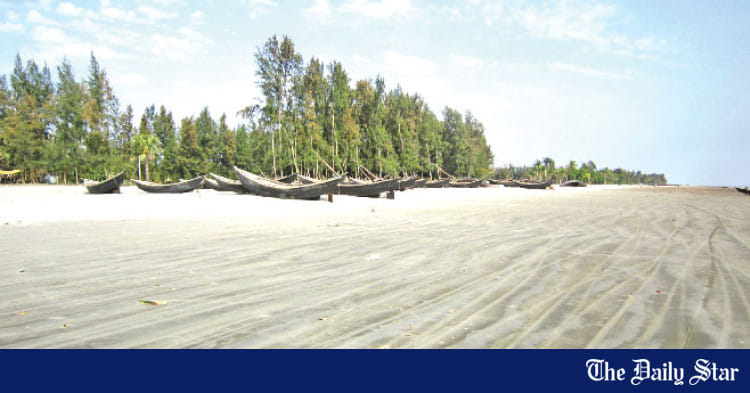Plastic waste plagues Kuakata | The Daily Star

Patuakhali’s scenic coastal town of Kuakata is grappling with the persistent issue of non-biodegradable plastic waste, including one-time use plastic products and polythene, which are causing significant damage to the environment and neighbouring rivers.
The adverse effects of these pollutants are alarming, and despite efforts to tackle the problem, effective implementation of the ban remains a challenge.
Fisherman Abdul Alim, who relies on the Andharmanik river for his livelihood, said that he has noticed a considerable decline in the river’s fish population, especially in the last couple of years,due to the presence of plastic waste strewn along the riverbanks.
The pollution of river water has worsened, primarily due to improper disposal of human waste in close proximity to the river, he added.
Kuakata Beach, a popular destination for both locals and foreign tourists, has become a dumping ground for plastic and polythene waste. A recent survey conducted by Blue-Gard, a voluntary youth organisation, in a survey in 2022 found that approximately 23kg (22.77kg) of non-biodegradable waste accumulates on the beach daily.
Kuakata Beach, a popular destination for both locals and foreign tourists, has become a dumping ground for plastic and polythene waste. A recent survey conducted by Blue-Gard, a voluntary youth organisation, in a survey in 2022 found that approximately 23kg (22.77kg) of non-biodegradable waste accumulates on the beach daily.
Manik, a member of Blue-Gard, expressed concern over the deteriorating condition of the 18-km long Kuakata Beach, emphasising the need to quantify the amount of waste being dumped.
Sagarika Smriti, a research associate at Ecofish, a development organisation, emphasised the critical importance of preserving marine biodiversity and keeping oceans pollution-free. “The presence of various types of garbage, specially hazardous plastic materials, is increasingly harming the marine ecosystem, which greatly affects our survival,” she said.
Motaleb Sharif, general secretary of the Kuakata Hotel Motel Owners Association, acknowledged that the use of polythene and plastic by tourists contributes to the beach’s deterioration.
However, he suggested that by raising awareness among tourists and promoting alternatives to polythene, it is possible to reduce environmental pollution in the area.
Rumman Imtiaz Tushar, owner of Ilish Park, a resort, mentioned the recent distribution of 150 dustbins by the tourism board, which enabled tourists to dispose of their plastic waste responsibly.
While this initiative helped control plastic pollution to some extent, Tushar believes that encouraging both locals and tourists to use polythene alternatives will be crucial in maintaining a healthy environment on the beach.
In 2019, several environmental organisations, including the Bangladesh Environmental Lawyers Association, filed a petition with the High Court seeking a ban on plastic products. The High Court subsequently prohibited the use of single-use plastic products in hotels, restaurants, and coastal areas, nationwide.
Additionally, the government was instructed to monitor the market, seize polythene manufacturing equipment, and shut down factories to ensure strict compliance with the ban.
However, despite the court’s directives, the production and marketing of these environmentally harmful products, including one-time use plastic polythene bags, persist unabated.
Lincoln Bayen, Bela’s Barisal divisional coordinator, emphasised that plastic and polythene waste entering rivers, canals, and seas pose a grave risk to the country’s environment and drainage systems.
The accumulation of non-biodegradable polythene bags in the soil has also led to a significant reduction in soil fertility, negatively impacting agricultural production.
Bayen stressed the urgent need for the full implementation of the court’s ban on one-time use polythene production and increased public awareness.
Contacted, Kazi Saifuddin, assistant director of the Patuakhali Department of Environment, acknowledged the ongoing efforts to discourage the use of plastic and polythene. He revealed that local licenses for polythene and plastic production have not been granted, and mobile courts have been conducting punitive measures against violators in various markets, hotels, and restaurants.
“However, due to a shortage of manpower, comprehensive actions against polythene usage have been challenging to carry out,” he said.











